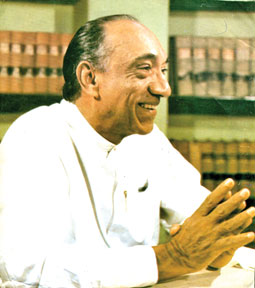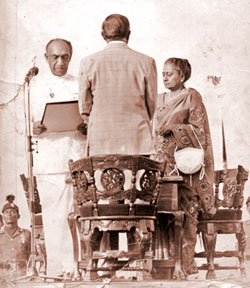JRJ, the astute politician
By Jaliya WIJEYEKOON
Sri Lanka has produced 10 national leaders since independence and J.R.
Jayewardene occupied a foremost place among them as the most astute and
veteran politician in the annals of the political history in Sri Lanka.
His 103rd birth anniversary coincides with the 18th Amendment to the
Constitution which he introduced in 1978 amidst various objections from
all political circles. Born to a family with a legal background on
September 17 1907 and educated at Royal College Colombo Jayewardene, a
lawyer turned politician first entered the State Council during the
colonial period.
 Thereafter he held several positions in the Lankan political arena
such as the Minister of Finance in the first Cabinet formed by Right
Honourable D. S. Senanayake, the Opposition leader and the Prime
Minister. He finally rose to the most prestigious position of the
Executive President in the country with the introduction of his
brainchild, the 1978 Republican Constitution. Thereafter he held several positions in the Lankan political arena
such as the Minister of Finance in the first Cabinet formed by Right
Honourable D. S. Senanayake, the Opposition leader and the Prime
Minister. He finally rose to the most prestigious position of the
Executive President in the country with the introduction of his
brainchild, the 1978 Republican Constitution.
Unanimously elected
With the untimely demise of Dudley Senanayake in 1973, Jayewardene
was unanimously elected by the UNP membership as the Leader of the party
who had already been an experienced and with a far-sighted vision of the
political affairs of the country.
After becoming the leader of the party he completely restructured the
party mechanism and launched an aggressive campaign against the
government of Sirimavo Bandaranaike on all vital issues adopting
different methods such as Sathyagrahas, protest marches and token
strikes.
At the 1977 general election the UNP headed by J.R. Jayewardene
secured a historic victory of over a five-sixth majority in Parliament
reducing the SLFP to a mere eight members.
This victory gave JRJ an opportunity to introduce a new Constitution
and also an Executive Presidential system to the country. Jayewardene
became the Executive President of Sri Lanka in February 1978 and
immediately initiated a number of major development projects which
provided several employment opportunities to local youth.
JRJ had great faith in the younger generation, who would be the
leaders in the country tomorrow. The distribution of free school books
and uniforms to all schoolchildren was a result of it and became the
first national leader in the entire world to do so.
Developing irrigation
JRJ also had a great interest of developing the irrigation network of
the country which helped to develop the agricultural sector. Accordingly
he developed the irrigation system at Kotmale, Maduru Oya, Randenigala
Rantambe, Lunugamvehera and Inginiyagala.
He pioneered the introduction of Sri Lanka's first Free Trade Zones
that created over 400,000 employment opportunities for youth.
Thereafter, he introduced the open economy system and generated
nearly 300,000 jobs in the Tourism sector and the open economy also
helped the country to attract foreign investors to start various
industries.
JRJ introduced new economic policies to Sri Lanka before the same
policies were introduced by other leaders of the day such as Ronald
Reagan of USA, Narasinha Rao in India, Margaret Thatcher of UK and
Dengxia Peng of China. The concept of garment industries were also
introduced during the tenure of President Jayewardene and at present
over 500,000 persons in the country are engaged in direct and indirect
employment.
In addition, JRJ's name will go down in history for introducing
television to Sri Lanka and establishing the Sri Lanka Bureau of Foreign
Employment to send Sri Lankan skilled and unskilled workers for
employment in Foreign Countries. As a result over 1.5 million Sri Lankan
workers are currently engaged in foreign jobs.
The construction of the one million housing program was also
commenced during the period of President JRJ and it immensely benefited
a large number of rural and urban homeless people. The program was also
recognised by the United Nations.
The Japanese government also constructed the new Parliamentary
Complex, Rupavahini Network and the thousand bed Sri Jayewardenapura
Hospital as a token of appreciation and gratitude for the historical
speech made by JRJ on behalf Japanese government at the San Fransisco
International Conference in 1951.
Global Village
JRJ also turned Sri Lanka into a global village by introducing
Information Technology to the country. This immensely helped Sri Lankans
to bridge the gap between various international communities through the
internet.
The development in the field of Information Technology later led to
the introduction of the mobile phones which over 10 million people use
today.
In addition the Colombo Plan was also initiated by Jayewardene to get
financial assistance for developing countries from developed nations.
 |
|
Prime Minister J.R.Jayewardene taking
oaths as the first Executive President of Sri Lanka before
Chief Justice Neville Samarakoon |
As Minister of State under Dudley Senanayake's government of 1965-70
Jayewardene rendered an invaluable service to promote the tourist trade
in the country. A number of hotel projects was initiated, Travel Agents
and Tour operators were encouraged and entered into a number of
contractual agreements with other countries to facilitate the promotion
of tourism in the country.
There is no argument even by his political rivals that J.R. had been
instrumental in developing the socio-economic standards of the nation
during his tenure as a parliamentarian and as the first Executive
President of Sri Lanka. But quite ironically to all these positive
achievements it is also recorded in political history that there had
been a number of occasions during JR's tenure where Democracy was
threatened, the judiciary was condemned, justice and fairplay was not
upheld, human rights violations were rampant and rigging of votes at
elections on a large-scale.
JR soon after assuming duties as the Prime Minister in 1977 demanded
letters of resignation from all UNP Parliamentarians contradictory to
accepted democratic norms, mainly to keep his subordinates under his
iron fist. But as a politician he tried to project himself as a true
democrat right throughout his career before the public.
The new Constitution that he introduced has vested all powers on the
Executive Presidency and it was the general saying that the only thing
which cannot be done by the Executive President is to make a man a woman
and vice versa.
Scant respect
President Jayewardene exploited all executive powers during his
tenure to suit his political ideology sometimes paying scant respect to
the rule of law.
When Kalawana MP Pilapitiya was unseated on an election petition by
the Supreme Court, J.R. immediately moved the 8th amendment to the
Constitution and accommodated Pilapitiya in the House to the surprise of
all politicians and the public.
J.R. swiftly took legal action against his political rivals who were
even marginally involved in anti-government activities. It is the
general belief that JRJ with his far-sighted political vision, was not
happy with progressive political forces of the day and placed all
possible restrictions across their political paths.
During JRJ's tenure, there were a few occasions where high ranking
police officers were convicted by the courts for certain offences and
monetary punishments were imposed on them, which were subsequently paid
by the government and the officers were promoted to higher ranks by the
relevant authorities with the blessings of the government.
Although JRJ hailed from a family of legal luminaries and himself a
lawyer was not happy with the members of the Judiciary who went against
his decisions and political ideologies. It is recorded in the police
books that the goons who humiliated the judges and pelted stones on
their houses were the thugs sponsored by UNP trade union JSS which is a
brainchild of JR.
The 1980 July strike marked a gloomy milestone in the trade union
history of Sri Lanka. All who took part in the strike were dismissed
immediately from their employment.
It was a violation of human rights which took place during JRJ's
first term of office. When Chandrika Kumarathunga's government came to
power in 1994 some of the employees were re-instated, some were
compensated, some had died due to poverty and a few had even committed
suicide.
Infamous Referendum
Election related violence and rigging of votes, had its fair share in
the infamous referendum held in 1982 by the JRJ government to extend the
term of office.
A large number of votes was impersonated throughout the country,
ballot boxes were stuffed with marked ballot papers, anti-party
supporters were chased away and prevented from exercising their
franchise at the referendum. However, no action was taken by the
authorities to punish the culprits as they had State patronage.
A massive destruction of life, private and public properties took
place in 1983 with the July riots. But the general belief is that the
extent of the massive destruction could have been easily curtailed
provided the timely actions was taken by the government. It is quite
appropriate for a person who writes the recent political history to
state that the tenure of J.R. Jayewardene was mixture or a
conglomeration of positive and negative achievements and happenings in
Sri Lanka.
|

